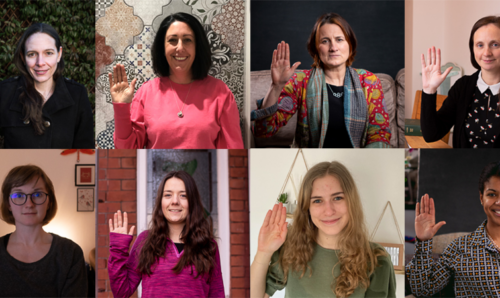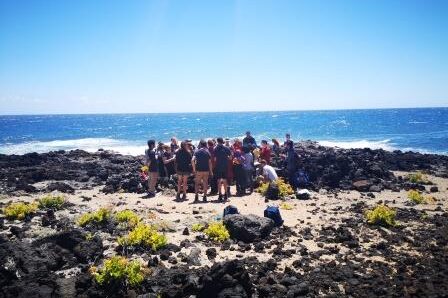International Women’s Day 2021: Prof Giles Johnson
Meet the Department Research and impact 3 March 2021
To celebrate this year’s International Women’s Day on 8 March 2021, we are sharing inspirational stories from staff and students across the Faculty of Science and Engineering, showing what they #ChooseToChallenge in their roles at the University.

It might seem odd to profile a white cis male for International Women’s Day but the fight for equality doesn’t just fall on the shoulders of women, it takes every member of society to stand up and advocate for equality. Many men are challenging the ‘norm’ and working to progress women’s rights and Prof Giles Johnson is one of them.
Giles is Professor of Environmental Biology and the Head of Equality, Diversity Inclusion and Accessibility (EDIA) in the School of Natural Sciences and is passionate about EDIA “because it matters and because I want to help make Manchester a better place to work”. His own academic journey was, in his own words, straight forward and ‘easy’; “I became a tenured lecturer at the age of 28, which was young at the time, too young really, and is essentially unheard of today”. While Giles acknowledges his own privilege, joking “obstacles are really not part of the game for a cis white male!” the experiences of some of the women in his family have spurred him on to help make a difference.
#ChoosingToChallenge: Issues of inequality
Giles’s mother went to university aged 30 with three children. She completed her PhD the same year as Giles, having combined raising a family with trying to build a career. She eventually got a permanent position, after years on short-term contracts, but had to sacrifice much to achieve this. Giles’s wife left science after completing a PhD coinciding with having two children. The realities of academic career structures put her off. Most recently Giles’s daughter decided to reject the option of a PhD in physics because it seemed her academic dreams were incompatible with her desire to have a settled family life. Seeing women deterred from science or progressing their careers because of simple barriers are exactly the reason that so much equality work exists.
While society has come a long way from where it was, Giles comments that “academic life can be very macho”, competitive behaviour is looked upon favourably and there is pressure to be locally, nationally, and internationally “successful” according to some narrow definitions of success. This approach is at odds with the fact that the best academic work usually comes from collaboration and exchanging ideas. Despite this, Giles notes that there has been a significant improvement in supporting cross-collaborative work during his time at Manchester. There is a growing recognition of the importance of diversity at work and there is support for creating an atmosphere where people are recognised for what they contribute rather than conforming to a particular stereotype.
Removing barriers and supporting women’s career progression
This is why Giles is working, as part of a team drawn from across the Faculty, towards an application for a Silver Athena Swan award in November 2021. The Athena Swan charter was set up to addresses gender equality in science, technology, engineering, maths, and medicine (STEMM) and “challenges us to own the issues of inequality and makes us look at the numbers to understand the problem and seek to improve on what we do”.
Through the charter, the University is improving its gender equality, and is starting to look more critically at the language used in job adverts, the career progression of staff and representation in the student body. Giles explains; “we are currently piloting a scheme of positive action in recruitment which could have a real impact on the mixture of people coming into the University, but we need to make sure that career progression is supported with better line management, proper implementation of flexible working practices and a promotions system that fully recognises the different ways in which individuals contribute to the institution”.
The covid-19 pandemic and gender inequality
This recognition of where improvements need to be made has never been more pertinent that in the last year. The COVID-19 pandemic has laid bare the stark realities of gender inequality and has added a whole new dynamic to the challenges faced by much of the University community, especially those with protected characteristics. There is mounting evidence that women have been disproportionately affected by the pandemic, which has been noted in the University’s COVID-EDI survey.
Reflecting on how the institution has responded to the impacts of the pandemic, Giles says, “if I were marking us as an institution, I would probably be writing; ‘good effort but with some weaknesses’. Lockdown has resulted in an incredible increase in workload for many people across the University. Understandably, there has been a particular focus on making sure we continue to do the best we can for our students but sometimes this has meant that staff feel forgotten”. Giles feels that the most important things we can really offer are short-term support where needed but long-term strategies for mitigating the impacts on people’s careers, “it is really important that we do things to lessen the differential impacts. There will be a piece of work to carry on with over the next three to five years, but we are moving in the right direction. I hope that we will be successful with our Athena Swan application and demonstrate the great work the Faculty and University is doing to make sure this is a fair and equitable place to work”.
GILES IS CHOOSING TO CHALLENGE: THE ISSUES OF INEQUALITY
Discover the other staff and students from the Faculty of Science and Engineering who are taking part in our International Women’s Day Choose to Challenge campaign.
AcademicAcademic InterviewAthena SwanCareerGiles Johnsoninternational women's day 2021Interviewsocial responsibilityworking in reseach




Leave a Reply